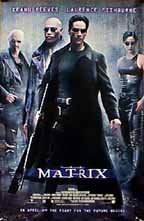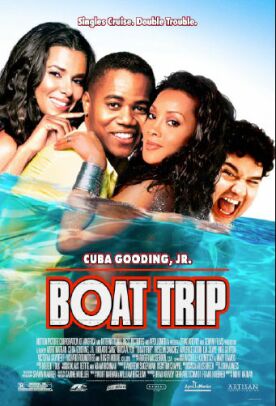Matrix, The
When the winner of the Big Game lottery jackpot of $197 million didn’t
immediately come forward to claim his prize recently, newspapers were reduced to
running an AP photo of the shop in Boston where the winning ticket was sold. In
the photo a young man is shown from behind as he affixes a sign outside reading:
“WE SOLD A JACKPOT TICKET HERE!” On the back of the young man’s T-shirt is
another triumphant slogan: “LIMITS EXIST ONLY IN THE MIND.” Actually, this
message is at least as much a come-on for the lottery player as the other, since
its brainless rhetorical optimism nicely sums up the ethos of American
kid-culture which does so much to encourage Lotto fever and other signs of
American decline, not excluding cinematic ones.
The most obvious recent example is The Matrix, a Joel Silver
extravaganza written and directed by Andy and Larry Wachowski. This was the
number one movie in the country—by a long way—in the week of its
release, which ought to tell you something about the proportion of teenage boys
in the movie-going audience, since to an adult taste it stakes a claim to be the
most boring movie ever made. This compendium of fashionable clothes, fashionable
accessories (guns, cell phones) and fashionable gestures ends with Keanu Reeves,
aka “Neo,” aka “The Chosen One,” telling us in voiceover that the victory of the
hip resistance fighters over the straight minions of “the matrix,” its paranoid
fantasy of an all-powerful conformity enforcer, reveals to us “a world without
rules and controls, without borders or boundaries; a world where anything is
possible. Where we go from here is up to you.”
Message from Grownupville to Keanu: there ain’t no such world. More to the
point, such a world is not even honestly imaginable. Even 14 year-old boys know
that at some level. But this film’s cynical appeal to mere wish-fulfilment
fantasy is seen as mere harmless “escapism.” A question: what have middle-class
kids in America got to escape from? Is life so bitter to them that they must
beguile their abundant free hours with fantasizing about being able to stop
approaching bullets or kung fu fight in mid-air or be resurrected from the dead
by love like Keanu? He and his equally buff, equally hip love interest, Trinity
(Carrie-Anne Moss) and his super-hip mentor, Morpheus (Laurence
Fishburne)—the only one of the three who is appropriately
named—continually reiterate the movie’s message: “Free your mind” and
anything is possible, including the suspension of the laws of physics. At the
very least, such a lesson in popular nonsense is hardly calculated to hasten the
onset of responsible adulthood.
Maybe we shouldn’t care; maybe we should let the kids be irresponsible kids.
Even as irresponsible as this. But I believe that it can do nothing but harm to
spend so much of their lives in a fantasy world. Apart from anything else, they
are staying in it longer and longer, as this movie’s popularity reveals. You
don’t get to be number one with only a teenage audience. Besides, the
movie teaches kids contempt for the values of work and sobriety and conformity
to social norms, here represented by machines got up to look like FBI or Secret
Service agents in dark suits, dark glasses and little earpieces. These imitation
people are supposed to serve “the system” or “The Matrix” which is said to make
real people its unwitting slaves. “The resistance,” led by Morpheus, wants to
save people stuck in the system—i.e. grownups with jobs, families
etc—but many don’t want to be saved. “Many are not ready to be unplugged”
from the machine, says Morpheus. Thank God for that, at least. But for how much
longer will it be true?
Discover more from James Bowman
Subscribe to get the latest posts to your email.








